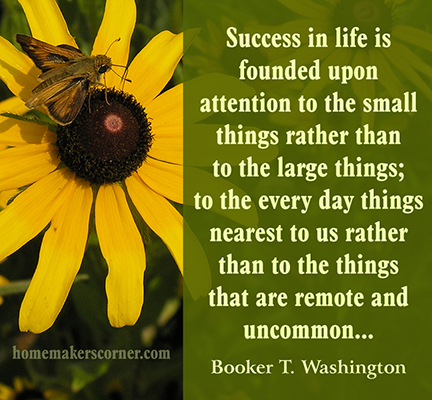Dealing with Laziness
and Low Motivation
Aug. 2020

Reader's Question:
I’ve been reading your blog and I currently work part time, but because of the virus, I am not technically working right now and this time has made me realize how lazy I am. I don’t want to be this way and I’m trying to change, but I feel the saying is true that old habits die hard. Do you have any tips on how to stop being lazy and get down to homemaking? Any advice would be appreciated.
Answer:
I struggle with the issue of laziness in a somewhat different way because I have some chronic health issues that affect my stamina and ability to accomplish things. In my situation I tend to feel like I'm not accomplishing enough, but when I push myself too hard I often end up with a temporary injury, a migraine or abnormal exhaustion which then forces me to slow down or even stop for a day or more. Sometimes for weeks. Finding the right balance for not feeling lazy and also not overdoing things is challenging sometimes. This is very frustrating, but it also gives me a somewhat different set of issues to deal with. For that reason, I asked my friend, Elisabeth, to answer this question because her experience comes from a healthy person perspective. :-) I think her advice can be used by all of us in whatever situation we find ourselves battling laziness, lethargy or lack of motivation. (I'll add some more observations farther on.)
Here's what she wrote:
I grew up as an only child in a very laid-back household. I was homeschooled through all my school years, but we didn't have any type of routine. I got used to being able to take my time to get things done. Having married later in life, I am now working on building better habits and routines. Laziness has been the hardest habit to work through, and while I am nowhere near conquering it, I have a few tips that have helped me a lot.
1. Set a wake-up time and stick to it. Get up as quick as you can after the alarm goes off. Don't worry about bedtime...it will fall into place if you get up at the same time every day.
2. Decide how often you want to do housework (Example: I dust and vacuum every two weeks on Saturdays, but I split up the rooms in the house so that I do half one Saturday and half the next Saturday). Put it on your schedule, and stick to it.
3. If you're addicted to scrolling through your phone, choose certain times each day where you put the phone out of reach and do things on your to-do list OR sit down and read a book, write a letter, or anything that isn't electronic. Start with just a few minutes if it's especially hard to give it up, and gradually lengthen your phone-free time each day.
4. Front-load unpleasant tasks. Every evening, make a list of things you'd like to accomplish the next day, and put the most dreaded task(s) first.
5. My favorite saying: Do it today! Procrastinate tomorrow. :-)
![]()
Editor's Notes:
In case you didn't notice, a big part of getting victory in this is to stick to it. I just thought I should point that out first - both for my own benefit and yours. :-)
Getting back to the reader's question, though, I want to point out that there is a curious aspect to being stuck at home more - either from the lock downs or from avoiding too much people contact. I noticed it fairly quickly. At first it was almost a relief, I guess, to have an opportunity to just sit down and rest a bit without feeling too guilty about. There was nowhere to go, nothing much to do other than the usual household stuff, and very few people were going to be coming to our house.
Now we've had a rough year (2020) - my dad had a mini-stroke, we had to have two pets put down, we moved my mom into a memory care facility, my mom then died in March and we had a memorial gathering for her just before the lockdown started. I was mentally and emotionally exhausted, and that affected me physically as well. The opportunity to just set things aside for awhile and rest was probably more needed than burdensome.
 In this high-octane world we live in where women
are expected to do so much and be involved in so much, I know there are
others who also suddenly felt released from a lot of
pressure when it was mandatory to stay home. I think that taking some time to just rest and
refresh and do some fun or interesting projects was a good idea. I
know some people did use at least some of the time that way. But,
there are limits. :-)
In this high-octane world we live in where women
are expected to do so much and be involved in so much, I know there are
others who also suddenly felt released from a lot of
pressure when it was mandatory to stay home. I think that taking some time to just rest and
refresh and do some fun or interesting projects was a good idea. I
know some people did use at least some of the time that way. But,
there are limits. :-)
Something about the whole lockdown also tended to cause a lack of motivation for some. I know I wasn't the only one who felt it. I'm a stay-at-home wife who isn't obligated to go out a lot, and I still felt the effects of not trying because what was the point? No one was going to be around and we weren't going anywhere. It gives me a greater appreciation for those who live in remote or isolated situations who keep up with things and stay motivated to keep going.
Part of the battle of overcoming this lack of motivation is just to acknowledge the problem and decide to do something about it. The doing part is still going to be challenging, but the problem would never be addressed if it wasn't seen. So, just seeing that there's a problem is a good start.
Next it's important to make a plan to overcome this problem. Without a plan of action we only become distressed about all that we aren't getting done. So, in addition to Elisabeth's great ideas above, here are a couple more suggestions from my own experience that might also help.
1. Use a daily planner.
My friend suggested writing down what you want to do the next. This is a great idea. I use a daily planner to do this. I seldom use any of the long term sections, but having a daily planner with the week visible at a glance gives me a place to write down the things that need to be done on specific days - like collecting all the trash on Thursday, and occasional appointments. I use an erasable pen because sometimes I can't do the things I intended to do and have to move them to another day.
I also recommend writing down all the things you did that you didn't plan to do. Some days I'm surprised at how much I actually did get done, just not the stuff I intended to do. Other days I'm surprised at how little I got done despite feeling relatively busy. This provides a clearer picture of what you are actually accomplishing and where you tend to fall short. If you divide the day into morning, afternoon, and evening you may even see where your most work gets done and can plan to do things accordingly. And, as Elisabeth recommends, put the most dreaded stuff early in the day, if at all possible, so that you can at least know you really did accomplish something that was hard to you. [Side note: It doesn't matter if it's hard to others or not. You celebrate your own hurdles leaped. Don't let someone else's abilities make you feel like there's something wrong with you. Just sayin'... :-) ]
2. Put your timer to use.
As mentioned, you can train yourself away from spending too much time on electronics by setting specific times to not use it. Work your way up and try giving yourself one electronics-free day a week. You might find it surprisingly freeing.
But the timer can be put to other uses. For those huge tasks that seem overwhelming (like sorting junk in the garage, cleaning out the sewing room or getting yard work done), set a timer. Start with 10-15 minutes. Work on the project, then go work on something else. If necessary you can do this once a day. If possible, you can work up to several work periods, or you can lengthen the work periods. I have used this method and it works. I found that if I was making good progress I would sometimes reset the timer and keep going. If I was struggling, I could just stop and go rest or do something more enjoyable or less stressful and know at least I made a little progress.
3. Schedule in the more enjoyable things too.
Sometimes we can tend to think that we shouldn't be doing anything that is really enjoyable or fun when there are chores waiting that we don't enjoy. I think it's a good idea to schedule in some of the fun and enjoyable things to make sure we don't get burn out. In fact, I think that one of the messages of Ecclesiastes is that we need some good vanity to keep us in the fight. If we cut out everything of that sort it is likely to make us less productive. So, make time for reading, watching something you especially enjoy, writing, art, crafting, playing with your children/grandchildren or pets, taking a nap, meeting friends for coffee, photography, family game time, etc. Whatever recharges your motivation in a good way will help you more if you actually take time to do it. :-) My own mother read out loud to us many, many evenings over the years. I think it was as enjoyable for her as it was for us kids because it gave her time to sit down in the evening without kids making constant racket. haha ;-)
4. Get an accountability buddy.
Find someone who loves you and will encourage you, and who will keep stuff to herself. :-) If you're struggling to tidy an area or to do some basic cleaning, take a photo and send it in a text message or email and tell your friend what your goal is. Then when you finish it, send another picture of the finished job. This is really good for motivation. I've done it and it helps. :-)
In closing, I just want to mention again that it is really important to stick to it. If you want long term improvement you will simply have to make yourself get up and do what needs doing. How that looks day to day in your home is up to you, but improvement doesn't come without effort. Ask the Lord to give you wisdom and help in following through. He cares about even the small stuff.
Colossians
3:23-24 And whatsoever ye do, do it
heartily,
as to the Lord, and not unto men; Knowing that of the
Lord ye shall receive the reward of the inheritance:
for ye serve the Lord Christ.
![]()
background and graphics by Mary Stephens
vintage graphic: unknown source
published Aug. 2020, CA
